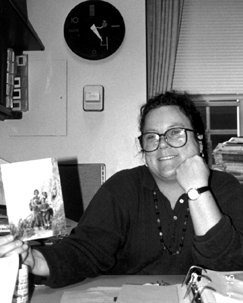| T H E N I H C A T A L Y S T | N O V E M B E R - D E C E M B E R 1 9 9 6 |
SINGLE WITH CHILDREN
If juggling careers and parenting is a double challenge for professional couples, it's at least a triple challenge for single parents. In addition to the usual problems finding adequate childcare and extra dilemmas in finding backup care when kids are sick or when parents must travel to meetings, single parents may have more financial worries and an intensified struggle trying to cram their lives into a 24-hour day. Carol Thiele, a section chief in the Pediatric Oncology Branch at NCI, became a single parent just as she was coming up for tenure eight years ago. Her son Francesco is now 12. Important for her success was living close to NIH and to her son's excellent daycare - the program that is now the NIH-sponsored Executive Child Development Center - even if it meant settling for a smaller house in the pricey Bethesda housing market. Thiele says the hardest thing for her as a single parent "was coming home after working and then having to help my son on school work." Her expectations of a more relaxed after-work life were based on the era she grew up in. "I am from a very traditional household where Mom would make a nice dinner every night." But in the home she runs, she says, "we do a lot of hot dogs and I don't worry that my house is not as clean." One thing that has helped on all fronts - from allowing her to enlarge her house to making family evenings more peaceful - was a salary adjustment won by the Women Scientist Advisors last year. "That was very important to me and enabled me to buy time - to get help to clean the house, to get more dinners out, to hire tutors, or to hire someone to stay with my son when I was out rather than just dumping him off at a friend's house." Basically, she adds, the salary adjustment "allows me to spend more fun time with my son." A personal challenge for Thiele has been learning to ask for help. "I had to learn to stop thinking I had to do it all myself, (to realize) that you're not a bad person if you can't do it all. But that applies to any scientist with children because our days are more rigid than other people's." To break out of untenable isolation, Thiele and many other scientist- parents say domestic networking is important - interacting with other parents from their children's school, church, or after- school activities or calling on the help of teachers, tutors, neighbors, and family. Lynn Gerber, chief of the Clinical Center's Rehabilitation Medicine department, has been a single parent for five years - since her daughters Alex and Suzannah were 17 and 8, respectively. "The most difficult thing about being a single parent is to maintain a consistent level of excellence and effort over the long haul," Gerber says. "A person can always do one thing well. But when you have a high-powered job that requires you to be 'on' day after day after day, it's enormously demanding." And on the home front, she says, "you know that no one is going to relieve you - it's not a shared experience. There are no fallbacks. If you're lucky, you may be able to afford some daytime help, but otherwise, you're it, emotionally and physically." Gerber wards off this world-weariness with a wide circle of friends and activities. "The antidote is to have multiple 'bank accounts,' each with different resources - professional feedback, interpersonal friends, children, spirituality - that you can draw upon; to paraphrase Mrs. Clinton, 'it takes a village to support a single parent, '" Gerber says. "For example, I am a tennis player. When I couldn't play after I hurt my knee, I would draw on other physical activities that I like, or other projects - like reading books. When I'm discouraged here at work, I get more involved with my reading group - another intellectual activity that is part of my life." Gerber would like to see NIH and the Clinical Center strive to give women more flexibility in planning their careers around family, in using flextime and flexplace wherever possible and desired, and in allowing them to bring their children into the workplace. Elizabeth Read, chief of the Cell Processing Section in the Clinical Center's Department of Transfusion Medicine has been a single parent for three years, since her children Maddy and Sam were 11 and 6. She says her greatest challenges as a single parent have been "never quite having enough time to do as good a job as one would like at work or at home, and not having enough 'down time' to unwind from either work or home responsibilities." Read says she attacks these problems on multiple fronts - recruiting out-of-town parents to sit when she must travel and when her daughter had chickenpox, networking with her children's teachers and parents of their friends, and recruiting her children's help. "In recent years, I have made a real point of teaching my kids organizational skills and taking more responsibility for their schedules, personal belongings, homework, and music practice. This has taken a lot of coaching on my part, but has paid off in the long run." --C.H.
|
